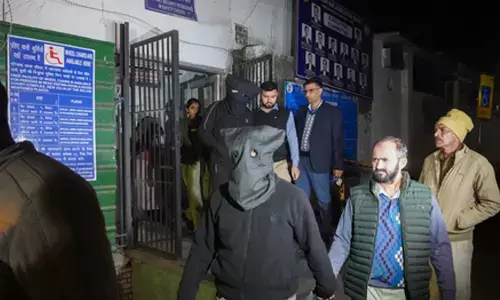Fatigue, insomnia early signs to watch out for burnout at workplace: Experts
Share :

Fatigue, sleeplessness, and frequent illness are the early signs that one should watch out for burnout and exhaustion due to workplace stress, and must take help, said experts on Thursday, amid reports of a young CA in Pune who succumbed to death due to work pressure.
New Delhi : Fatigue, sleeplessness, and frequent illness are the early signs that one should watch out for burnout and exhaustion due to workplace stress, and must take help, said experts on Thursday, amid reports of a young CA in Pune who succumbed to death due to work pressure.
Anna Sebastian Perayil (26), lost her life due to a “backbreaking workload” and “work stress” at Ernst & Young (EY), claimed her mother Anita Augustine in a heart-wrenching letter to Chairman Rajiv Memani.
Perayil worked for four months at the accounting firm, and yet “nobody from the office was present even for her funeral”.
Perayil is not alone. Earlier this year, Satish Nandgaonkar, a Mumbai-based senior journalist working for Hindustan Times, died after a cardiac arrest outside the daily’s office after reportedly being “humiliated” at the workplace hours before the episode.
In another tragic case, 25-year-old Saurabh Kumar Laddha, working at McKinsey and Company reportedly ended his life by jumping from the ninth floor of his building in Mumbai, after being unable to handle the work pressure.
The list can go on with many more names.
Dr. Suchismitha Rajamanya, Lead Consultant & HOD - Internal Medicine, Aster Whitefield Hospital, Bengaluru, told IANS that almost every week, "approximately 6 to 10 patients come seeking help, reporting stress and exhaustion".
“Burnout and exhaustion can display noticeable signs, and physically these signs could be chronic fatigue, insomnia as well as frequent illnesses,” Rajamanya said.
The expert explained that stress can also manifest as hopelessness, annoyance, emotional draining, decreased motivation in the upkeep of appearance, absenteeism, diminishing work performance, and unwillingness to engage in work tasks. Individuals may also struggle with concentration and memory problems.
“The key here is to prevent oneself from ‘getting to that point’ and therefore recognise the need for help when a person does,” Rajamanya said.
A recent report by Great Place To Work India, a workplace assessment and recognition organisation, showed that one in every four of all employees finds it difficult to speak about mental health issues like stress, burnout, anxiety, or depression at the workplace. Burnout emerged as a significant concern with 56 per cent of employees being affected.
Studies have also shown the negative health impacts of workplace stress. A recent study, published in the Journal of the American Heart Association, showed high job strain and effort-reward imbalance may significantly increase the risk of developing atrial fibrillation (AFib) -- an irregular heart rhythm condition.
Divya Mohindroo, Counselling Psychologist and Founder Embrace Imperfections told IANS that it is important to “think more practically rather than emotionally, and to strike a balance between their emotions and practical life”
She also suggested simple daily steps that one can take to minimise the impact of stress in their life.
“Keep yourself well hydrated throughout the day to help you release toxins, eat nutritious food, and indulge in 45 minutes of exercise where you sweat out your sorrows while releasing happy and feel-good hormones. The most important thing is to maintain a healthy good sleep cycle,” Mohindroo said.
The experts also suggested stress management techniques such as meditation or deep breathing; and to reach out to family, friends, or support groups, and a psychotherapist or a counsellor.








